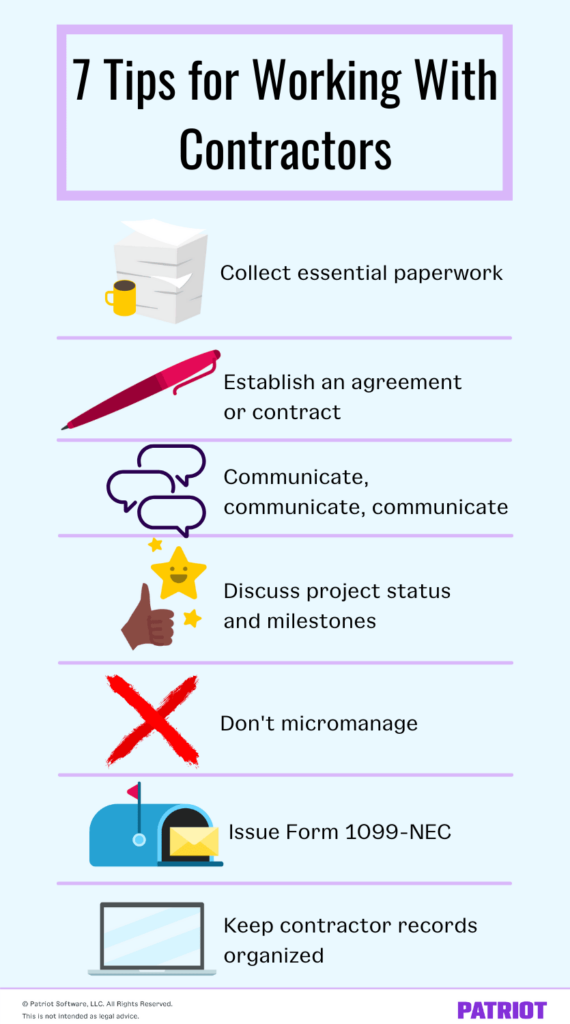According to a recent study, one out of every 10 workers is an independent contractor. With so many contractors making up the workforce, you’re bound to work with or hire one at some point.
Hiring contractors can be beneficial to your business. But if you’re going to be working with independent contractors, you need to know how to do business with them.
What is an independent contractor?
So, what exactly is an independent contractor? An independent contractor is an individual who performs work for businesses. However, they are not considered employees. In many cases, independent contractors run their own businesses.
Unlike employees, independent contractors do not have Social Security or Medicare taxes deducted from their pay. Instead, they pay their own income tax and self-employment tax on their earnings.
The IRS and FLSA have strict rules for determining whether or not a worker is an employee vs. independent contractor. Before you determine a worker’s status, review the Fair Labor Standards Act’s and IRS’s guidelines to avoid independent contractor misclassification.
7 Tips for working with independent contractors
If you hire independent contractors, you need to know the do’s and don’ts of working with them. Use the seven tips below to learn how to work with contractors.

1. Collect essential paperwork
Just like you would with employees, you must collect paperwork from your new contractors.
Give your contractor Form W-9, Request for Taxpayer Identification Number, to fill out.
Form W-9 gives you information about your independent contractor so you can accurately report their payments to the IRS. On the form, contractors must include information like their:
- Name
- Business name, if applicable
- Business entity (e.g., LLC)
- Exemptions
- Address
- Taxpayer Identification Number (e.g., SSN or EIN)
- Signature
All businesses must report nonemployee compensation of $600 or more to the IRS. Use the information on Form W-9 to help fill out IRS Form 1099-NEC at year-end.
Do not send Form W-9 to the IRS. Keep Forms W-9 in your records for safekeeping.
2. Establish an agreement or contract
Traditional employees have job descriptions that define their responsibilities. When working with independent contractors, you have to provide a different set of guidelines to establish rules and responsibilities. You can do this by creating an agreement or contract.
Create an agreement outlining the project and your contractor’s responsibilities. Contracts not only lay the groundwork for the project, but they also protect both parties. Not to mention, it doesn’t hurt to have everything in writing.
Your contract communicates how and when the project will get done. Typically, contracts include:
- The scope of the project
- A timeframe or due date
- Payment terms
- Company information (e.g., business name)
- Independent contractor information
- Signatures from both parties
Before the project begins, discuss the details with your contractor and see if they have any questions. Defining a clear plan early on will help prevent bumps in the road later on.
3. Communicate, communicate, communicate
Just like many things in business, communication is key when working with independent contractors.
Before your contractor begins the project, establish a process for communicating progress. How will you discuss progress? Will there be weekly progress reports? How about phone calls? Emails?
Consistent and clear communication ensures that problems are resolved quickly and helps avoid delays. And, having regular check-ins or reports keeps the project on track.
Talk to your contractor to discuss communication options.
4. Discuss project status and milestones
While you’re communicating with your contractor, you should be discussing the project’s status and milestones.
Setting goals and milestones for the project help keep your project running smoothly from the start line to the finish line. Because contractors determine how they’ll complete a project, be sure to discuss goals with them.
5. Don’t micromanage
The truth is, nobody likes a micromanager. You can’t expect your contractors to get any work done if you’re constantly hovering over them. Not to mention, you might drive some workers away by being too controlling.
When managing independent contractors, give them some space. Don’t be breathing down their necks every step of the way.
Instead of micromanaging, regularly communicate with your contractors. Check in with them to see where they’re at with the project. Give feedback and input as needed, but don’t step on anyone’s toes. If you want contractors to be productive, you need to trust them.
6. Remember to issue Form 1099-NEC
A crucial part of working with independent contractors is remembering to distribute and file Form 1099-NEC at year-end.
Again, if you paid a contractor $600 or more throughout the year, you need to file Form 1099-NEC. Send Form 1099-NEC to all applicable contractors.
Form 1099-NEC includes the following information:
- The contractor’s legal name
- The contractor’s address
- The SSN or EIN of the contractor
- The amount of money you paid the contractor
Check your accounting records to see how much you paid each contractor during the year. You must also classify the type of payment as well as the reason for the payment.
Keep in mind, you must send Form 1099-NEC to each applicable contractor and the IRS by January 31 each year.
7. Keep contractor records organized
To keep your books as accurate as possible, what do you do? You likely do things like organize receipts and keep thorough records of business transactions. Shouldn’t the same go for saving your contractors’ records?
From start to finish, you should keep detailed records of your contractors and their projects. Organize and store things like:
- Forms W-9
- Contracts
- Invoices
- Proof of payment
- Forms 1099-NEC
You can use basic accounting software to store these types of records. Or if you want to go the old-fashioned route, consider investing in a physical filing system to stay organized (e.g., filing cabinets, folders, etc.).
It can be helpful to keep records in case of discrepancies. The more adequate records you keep, the better off your business will be.
Stay on top of your accounting responsibilities with Patriot’s online accounting software. Easily record income and expenses, create invoices, and more. Get started with your self-guided demo today!
This article is updated from its original publication date of September 26, 2019.
This is not intended as legal advice; for more information, please click here.


